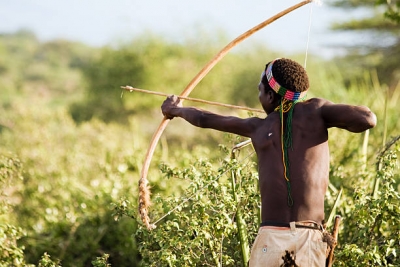
The African tribal populations are skilled hunters and gatherers. Hunted animals form a major part of their diet and supply the much-needed protein. Hunting skills are perceived as a scale of one’s physical efficiency and hence is a matter of great prestige within the group, especially among the men.
Different tribes follow distinctly unique hunting patterns. The Efe people, for example, often hunt alone. They use bows and poison-tipped arrows for hunting down monkeys and small antelopes.
Other groups like the Mbuti make extensive use of nets to corner and capture animals.
The Bayaka are perhaps the best-known net hunters. They form a semi-circular wall using these nets, which sometimes extend even up to a kilometre in length. Bayaka women shout and make noises to stun and chase the animals into the nets. The animals thus cornered, are then killed by the men using spears.
The rainforest serves as a mother to these people, nourishing and nurturing them with her vital supplies. However, encroachment of outsiders has led to commercialization and increased demand for bushmeat even in the overseas market and urban centres. This demand has negatively altered the sustainability of such peaceful hunting practices. Many susceptible tribal men are often taken advantage of and made to work as hired trackers for elephant poachers or commercial hunters.
Picture Credit : Google




